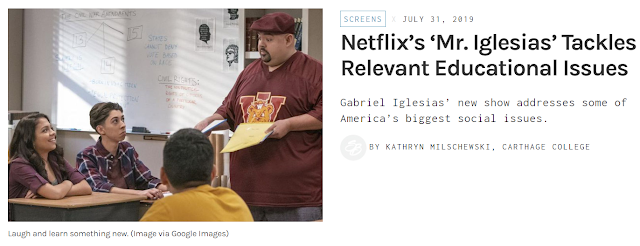My Son Was Watching Netflix's "Mr. Iglesias"
My son was laughing so hard yesterday afternoon. He was watching this comedy show from Netflix called "Mr. Iglesias". Iglesias was a social studies teacher and the first scene had him summarizing American History in a a few minutes, pointing out that the first few presidents of the United States wore powdered wigs, a tradition that stopped with Monroe, but reincarnated recently with a wig dipped in 'cheetos' dust. My son thought that was really funny. With all the humor aside, the show actually deals with issues affecting basic education. Kathryn Milschewski of Carthage College writes, "Overall, “Mr. Iglesias” highlights important educational issues and helps viewers to see education through a new lens. Though, at times, the characters might seem over the top and unrealistic, this is a comedy show at heart. Viewers are supposed to laugh at the characters and have fun while watching each episode, while still learning important lessons."
There are indeed plenty of lessons to be learned in basic education. The work of recent awardees of the Nobel Prize in Economics highlights the importance of field experiments in tackling questions that involve society. The issues are often far too complex that these issues need to be broken down into smaller and therefore more tractable questions. One example provided is how the Laureates, Abhijit Banerjee, Esther Duflo and Michael Kremer, arrived at the following findings: Textbooks and free meals do not significantly improve learning outcomes in schools in developing countries, but tutoring does.
Field experiments are indeed important in establishing evidence especially in education. However, one must still keep in mind that education still remains an arena where each individual, starting with the student to his or her teacher and parents, is an agent making decisions and choices. After all, each student is a person with a unique set of circumstances. One cannot easily distill education into a simple set of rules. More textbooks are certainly of no help if teachers and their students do not know how to use these. Free school meals may not be adding to scores in math and reading, but this free nutritional programs may be improving a child's health. Tutoring may be helpful but perhaps, not really in a direct sense. In the specific setting where this field experiment was performed, the tutors were chosen from the same community the children came from. Thus, social attitudes might also be playing an important role.
Kathryn Milschewski correctly points out that Mr. Iglesias "also demonstrates the complexity of a teacher’s job. Not only do teachers have to be prepared in the material they are teaching and the newest educational techniques, they need to be ready to empathize with students’ unique home situations and complex identities."
 |
| Above copied from StudyBreaks |
There are indeed plenty of lessons to be learned in basic education. The work of recent awardees of the Nobel Prize in Economics highlights the importance of field experiments in tackling questions that involve society. The issues are often far too complex that these issues need to be broken down into smaller and therefore more tractable questions. One example provided is how the Laureates, Abhijit Banerjee, Esther Duflo and Michael Kremer, arrived at the following findings: Textbooks and free meals do not significantly improve learning outcomes in schools in developing countries, but tutoring does.
 |
| Above copied from The Sveriges Riksbank Prize in Economic Sciences in Memory of Alfred Nobel 2019 |
Field experiments are indeed important in establishing evidence especially in education. However, one must still keep in mind that education still remains an arena where each individual, starting with the student to his or her teacher and parents, is an agent making decisions and choices. After all, each student is a person with a unique set of circumstances. One cannot easily distill education into a simple set of rules. More textbooks are certainly of no help if teachers and their students do not know how to use these. Free school meals may not be adding to scores in math and reading, but this free nutritional programs may be improving a child's health. Tutoring may be helpful but perhaps, not really in a direct sense. In the specific setting where this field experiment was performed, the tutors were chosen from the same community the children came from. Thus, social attitudes might also be playing an important role.
Kathryn Milschewski correctly points out that Mr. Iglesias "also demonstrates the complexity of a teacher’s job. Not only do teachers have to be prepared in the material they are teaching and the newest educational techniques, they need to be ready to empathize with students’ unique home situations and complex identities."
Comments
Post a Comment